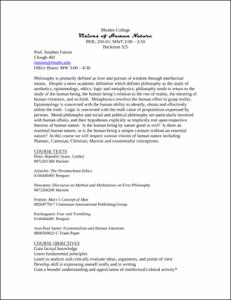Please use this identifier to cite or link to this item:
http://hdl.handle.net/10267/3519| Title: | PHIL 250-01, Visions of Human Nature, Spring 2007 |
| Authors: | Faison, Stephen Eliot |
| Keywords: | Philosophy, Department of;Syllabus;Curriculum;Academic departments;Text;Academic departments;Text;Academic departments;Text;2007 Spring |
| Issue Date: | 11-Jan-2007 |
| Publisher: | Memphis, Tenn. : Rhodes College |
| Series/Report no.: | Syllabi CRN 27298 |
| Abstract: | Philosophy is primarily defined as love and pursuit of wisdom through intellectual means. Despite a more academic definition which defines philosophy as the study of aesthetics, epistemology, ethics, logic and metaphysics, philosophy tends to return to the study of the human being, the human being’s relation to the rest of reality, the meaning of human existence, and so forth. Metaphysics involves the human effort to grasp reality. Epistemology is concerned with the human ability to identify, obtain and effectively utilize the truth. Logic is concerned with the truth value of propositions expressed by persons. Moral philosophy and social and political philosophy are particularly involved with human affairs, and their hypotheses explicitly or implicitly rest upon respective theories of human nature. Is the human being by nature good or evil? Is there an essential human nature, or is the human being a unique creature without an essential nature? In this course we will inspect various visions of human nature including Platonic, Cartesian, Christian, Marxist and existentialist conceptions. |
| Description: | This syllabus was submitted to the Rhodes College Office of Academic Affairs by the course instructor. |
| URI: | http://hdl.handle.net/10267/3519 |
| Appears in Collections: | Course Syllabi |
Files in This Item:
| File | Description | Size | Format | |
|---|---|---|---|---|
| 2007_sp_PHIL_250-01_27298.pdf | 30.92 kB | Adobe PDF |  View/Open |
Items in DSpace are protected by copyright, with all rights reserved, unless otherwise indicated.